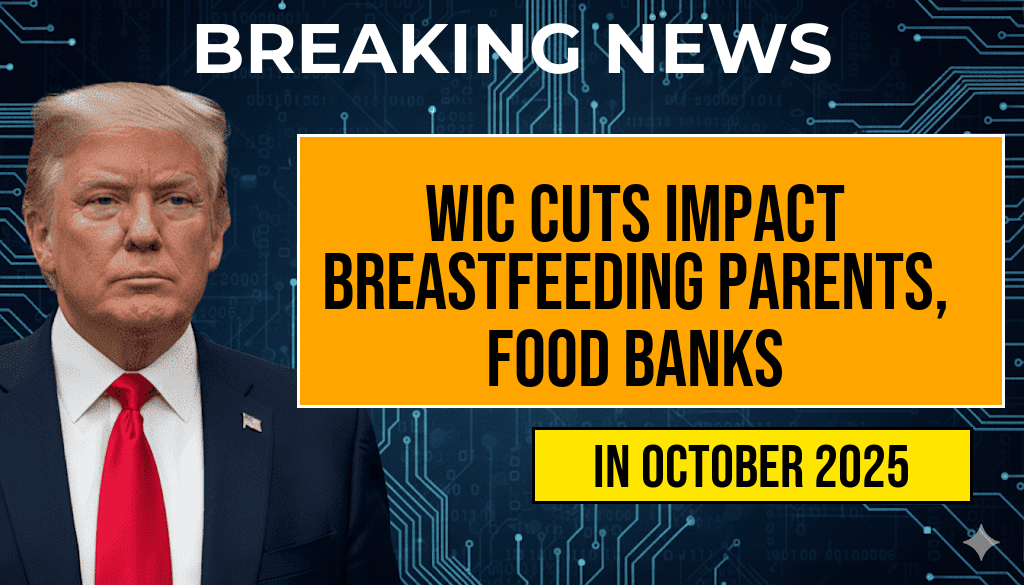As the federal government prepares to pause the Special Supplemental Nutrition Program for Women, Infants, and Children (WIC), breastfeeding parents are bracing for a significant financial impact. Starting next month, eligible families will face a monthly reduction of up to $52 in benefits, a move that advocates say could have serious consequences for nutrition and food security. The WIC program has long been a vital resource for low-income families, providing essential foods and support to ensure healthy growth and development in infants and young children. Food banks across the nation are gearing up for increased demand as families seek additional resources to fill the gap left by the impending cuts.
Understanding the WIC Program and Its Importance
The WIC program, established in 1972, serves millions of low-income pregnant women, new mothers, and their young children. Participants receive nutrition education, breastfeeding support, and vouchers for healthy foods. These benefits are crucial for ensuring that infants receive adequate nutrition during their critical early development stages.
The Financial Impact on Families
The anticipated $52 monthly cut comes at a time when many families are already struggling with rising food costs due to inflation. For many, this reduction in assistance could mean less access to essential items such as formula, baby food, and nutritious snacks. According to recent statistics, nearly half of the participants in the WIC program are breastfeeding mothers, making this cut particularly concerning for their health and the well-being of their babies.
- WIC benefits help low-income families afford healthy foods.
- Breastfeeding provides significant health benefits for both mothers and infants.
- The program aims to improve health outcomes for vulnerable populations.
Food Banks Preparing for Increased Demand
As the WIC pause looms, food banks are bracing for a surge in demand for their services. Many organizations are ramping up their efforts to ensure they can meet the needs of families affected by the cuts. “We are expecting a large influx of families seeking assistance,” said Maria Gonzalez, director of a local food bank in Chicago. “Our goal is to ensure that no child goes hungry due to these changes.”
Strategies for Food Banks
To prepare for the anticipated increase in clients, food banks are implementing several strategies:
- Community Outreach: Food banks are reaching out to local communities to raise awareness about available resources and services.
- Partnerships: Collaborating with local health departments and organizations to provide additional support and nutrition education.
- Stocking Up: Increasing inventory of baby formula and nutritious foods to meet the needs of families.
Advocacy and Future Actions
Advocates for low-income families are urging lawmakers to reconsider the timing and implications of the WIC cuts. Organizations like the Food Research and Action Center (FRAC) are lobbying for extended benefits and increased funding to ensure that vulnerable families maintain access to critical nutrition. The current pause in WIC benefits adds to the urgency to address food insecurity in the U.S.
Long-Term Implications
The potential consequences of these cuts extend beyond immediate hunger. Nutrition in early childhood is closely linked to long-term health outcomes, including obesity and chronic diseases. Studies show that inadequate nutrition during infancy can lead to developmental delays and health issues later in life. Ensuring that families have the resources they need is essential for the well-being of future generations.
Conclusion: A Call to Action
The impending $52 monthly cut to WIC benefits poses significant challenges for breastfeeding parents and their children. As food banks gear up for increased demand, community members and advocates are encouraged to support local initiatives aimed at alleviating food insecurity. It is crucial for policymakers to prioritize nutrition assistance programs like WIC to safeguard the health of vulnerable populations across the nation.
For more information on the WIC program and its impact, visit Wikipedia or the Food Research and Action Center.
Frequently Asked Questions
What is the reason for the $52 monthly cut for breastfeeding parents?
The $52 monthly cut for breastfeeding parents is due to the looming pause in the WIC (Women, Infants, and Children) program, which provides essential nutritional assistance.
How will the pause in WIC affect food security for breastfeeding parents?
The pause in WIC is likely to exacerbate food insecurity for breastfeeding parents, as they rely on the program for financial support in purchasing nutritious foods.
What measures are food banks taking in response to the anticipated impact?
Food banks are preparing for the impact by increasing their resources and outreach efforts to support families, particularly breastfeeding parents, who may struggle to access adequate nutrition.
Are there alternative resources available for breastfeeding parents facing financial strain?
Yes, aside from WIC, breastfeeding parents can seek assistance from local food banks, community organizations, and government programs that aim to provide food security.
How can breastfeeding parents advocate for the continuation of WIC benefits?
Breastfeeding parents can advocate for the continuation of WIC benefits by contacting their local representatives, participating in community forums, and raising awareness about the importance of nutritional support.






